Hidden Deck Fastening: 3 Ways to Fasten Your Composite Deck Boards

You put in a lot of effort on your new deck. The last thing you want is for your guests to notice the hardware you used to secure your boards. For a seamless look with no visible hardware, hidden fasteners are the ideal solution.
There are various types of hidden deck fasteners. Understanding the benefits of each, as well as how to install them and what to consider when shopping, can help you make the best choice for your DIY deck project

What are hidden deck fasteners?
Hidden fasteners offer a practical solution for securing your decking to joists without visible hardware, enhancing the clean look of your deck. Ideal for composite decking, these fasteners come in a variety of styles to suit different decking types, building needs, and personal preferences. This innovative option not only ensures a secure attachment but also maintains the aesthetic appeal of your outdoor space
Types of Hidden Deck Fasteners
Selecting the right hidden fasteners for your composite deck boards is crucial for a smooth installation process. Each type—deck clips, deck plugs, and color-matched deck screws—offers distinct benefits and unique uses, making them ideal for discreetly securing your deck boards. By understanding the time and effort required for each option, you can make an informed choice that suits your project's needs. Enjoy a seamless deck-building experience with the right tools and techniques at your fingertips

Deck Clips
To achieve a clean look across your deck, decking clips are a practical and efficient option for any builder. These clips slot into your board's grooves, making them nearly invisible when fastened. Deck clips also self-gap your boards, ensuring each board is equally and properly spaced without the need for constant measurement.
However, these clips need boards on either side to be fully secure, so you'll need to pair them with another hidden deck-fastening option for the edges of your deck. Offering a significantly faster installation process, each clip provides double the coverage of a traditional fastening screw.
If you're considering using decking clips, you might also want to explore compatible installation tools like the Trex® Universal Fastener Installation Tool. These tools can speed up the deck-fastening process by reducing the steps needed to install hidden deck clips, maintaining the proper angle, and minimizing common installation mistakes.
By incorporating these practical tools and methods, you can create a beautiful, seamless deck that not only looks great but stands the test of time.
Decking Plugs

Deck plugs offer a seamless finish, blending texture and color-matched plugs for nearly invisible hardware. By driving composite plug screws with a depth setter, you create a pocket above the screw. Once your hidden screws are secure, tap the deck plugs flush to achieve a screw-free illusion.
While deck plugs provide a sleek appearance, they require more effort to install than clips. For your easiest and best fit, Trex Hideaway® Deck Plugs match the exact shell stock, embossing, and pigments of Trex decking. These plugs use a signature pulley system that prevents having to gap, place, and tap every plug individually, and include extra grain options for the best possible visual match to your decking.
Color-Matched Deck Screws

To achieve a discreet visual for your deck, choose deck screws that are color-matched to your decking. These screws are ideal for fastening the boards along the perimeter of your deck, creating a cohesive look.
Color-matched screws can be used throughout your entire deck, easily screwing into joists to secure boards. However, they are more visible than other hidden fasteners and do not assist in gapping boards correctly, requiring manual measurement to maintain consistency.
Trex Hideaway® Composite Deck Screws offer a perfect, UV-protected color match for your Trex composite decking boards. These screws provide a cleaner, longer-lasting look, securing your boards—whether for the picture frame or the entire deck—with custom color-matching technology.
How to Choose the Right Combination of Hidden Deck Fasteners for Your Project
The effectiveness of different hidden deck fasteners varies, each offering unique advantages. Utilizing a mix of these fasteners across your deck can maximize the benefits of each type.
Your choice of hidden fasteners for your deck boards might hinge on your labor preferences and desired aesthetics. For optimal results, consider a blend of hidden clips along with deck plugs or color-matched screws.
Option 1: Deck Plugs and Hidden Fastener Deck Clips

If your timeline allows, combining hidden deck clips and deck plugs will create the best overall look—even if it takes a bit longer to install. For the edges, stairs, and breaker boards of your deck, you'll likely use square-edge boards. Here, deck plugs can offer a secure, streamlined appearance.
For the rest of the boards on your deck, you can use hidden deck clips. Using clips for a majority of your deck which will cut down on your install time and give you the most seamless aesthetic.
Option 2: Color-Matched Deck Screws and Hidden Fasteners Clips

Looking for more budget and labor-friendly deck hidden fasteners? Opt for color-matched deck screws and hidden deck clips. Color-matched deck screws have a slightly quicker installation process than deck plugs. Deck plugs are primarily utilized for small sections of your deck, such as the perimeter and stair installations.
Depending on your build, you may use groove boards inside your frame. For these boards, you will get the most benefit from decking clips. Decking clips like Trex Hideaway® Universal Hidden Fasteners create a hardware-free look while speeding up the timeline of your deck project.
Option 3: Color-Matched Deck Screws

If you're aiming to streamline your choices for hidden deck fasteners to just one, consider opting for color-matched deck screws throughout your deck. While using screws for each board is the most visible and labor-intensive choice among the three, it's usually not the primary preference.
This option can also be the most challenging when it comes to spacing your boards. Yet, if you prefer a familiar installation process that employs a single deck fastening method and reduces visible under-deck hardware, this might be the simplest solution for you.

When to Use Butt Joint Clips
Depending on the size of your project, you may need multiple boards to span the field of your deck. In this case, you may use either a butt joint where two boards meet or a breaker board to separate sections of boards. Either way, you'll need a way to fasten your boards while keeping your hardware hidden.
If you prefer to use a butt joint over a breaker board for your design, there are specialty butt joint clips designed to provide support for two boards on a single joist without the need for additional blocking. The Trex Hideaway® Butt Joint Clip is one of the few available options with an innovative design that offers you a quick, easy solution to a common deck installation headache. For installation, follow your manufacturer guidelines to maintain your deck's long-term safety and stability.
What to Look for When Buying Hidden Deck Fasteners

When seeking hidden deck-fastening options, understanding the distinctions between each type is key to making smart budget decisions. Specifically, there are significant variances between Trex deck plug screws designed for solid-core decking and scalloped decking.
- Solid-core decking requires a slightly longer plug screw than scalloped decking. Solid-core screws are two and a half inches long, while scalloped board screws are only two inches long.
- Scalloped plugs require you to pre-drill with a counterbore, while solid-core screws only require a depth setter for installation.
- Scalloped decking plug screws also have a wider head than solid-core decking screws.
It's crucial to select fasteners that are compatible and approved by the decking brand to ensure durability and a seamless finish. Choosing fasteners directly from the composite brand, such as color-matched options, can provide aesthetic benefits. Make sure to check your decking manufactures' installation guide.
It's important to avoid using wood screws on composite decking and vice versa, as this can lead to damage and reduce the lifespan of the deck. Ensure that color-matched screws come with UV protection to prevent fading, maintaining the deck's appearance over the years.
Additionally, check if the fastener system includes installation tools and secure bits to make the process smoother and more efficient. For a reliable fastener option, consider Trex Hideaway® Fasteners & Tools, known for their durability, ease of installation, and compatibility with various decking materials.
Learn More About Deck Fasteners
How to Install Decking Over Existing Concrete Slab, Patio, or Porch
Discover the best techniques to build a deck over concrete, ensuring proper drainage and stability, while creating a beautiful outdoor space.
Tile decking
Installing tile over a standard deck frame in an exterior environment is a recipe for trouble.
Introduction to Decking
Spacing between deck boards provides several critical functions, such as drainage & drying. Learn how to space and stagger deck boards at Decks.com.
How to Build Box Steps for Your Deck
Learn how to build a set of box platforms to act as stairs for a low deck. You don't need to cut stair stringers.
Building Cascading or Wrap Around Stairs
Learn how to build a set of cascading or flared stairs around an angled corner of a deck.
More Helpful Resources
Explore Articles by Topic

Footings
Information related to installing frost footings for decks

Framing
Learn structural framing methods

Decking
Learn about wood and composite decking materials

Stairs
An in-depth look at the complex issue of how to build stairs

Railings
How to install guardrails and handrails to meet IRC code

Features
An overview on water drainage, benches, planters and lights
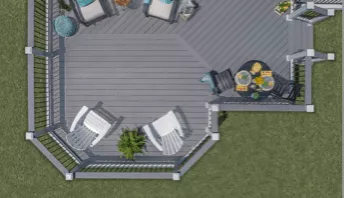
Design
The basics of deck design
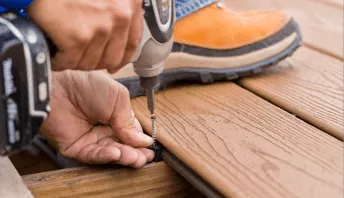
Planning
Learn about permits and working with contractors

Porches & Patios
Build a covered deck to enjoy all seasons
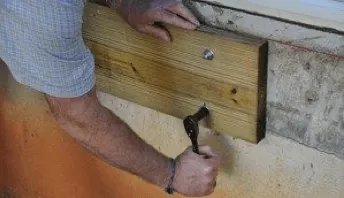
Ledger
Proper attachment techniques
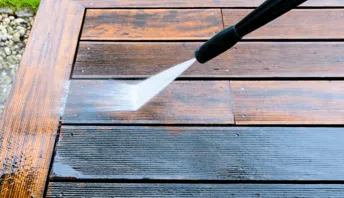
Care
Maintain your deck to maintain your investment
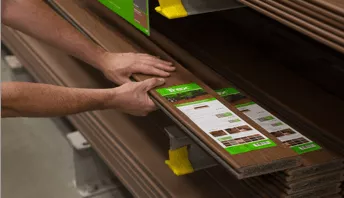
Materials
An overview on water drainage, benches, planters and lights
What to Consider When Building A Wrap-Around Deck
Looking to add a wrap-around deck to your home but unsure of what the process involves? Check out this guide to learn more about top considerations when building a wrap-around deck.
10 Common Deck Building Mistakes & How to Avoid Them
Building a deck can be a complicated process. Learn how to avoid falling into common deck building pitfalls with tips and advice from the experts at Decks.com.
Dos & Don'ts for Homeowners to Consider When Building a Deck
Your dream deck can take whatever shape you like. The trick is making it fit your budget and site conditions. While the deck doesn’t have to be built as a rectangle, there could be good reasons for doing just that.
Closed Stair Risers
Learn about the benefits of installing riser boards on your deck stairs.
Explore Articles by Topic

Footings
Information related to installing frost footings for decks

Framing
Learn structural framing methods

Decking
Learn about wood and composite decking materials

Stairs
An in-depth look at the complex issue of how to build stairs

Railings
How to install guardrails and handrails to meet IRC code

Features
An overview on water drainage, benches, planters and lights

Design
The basics of deck design

Planning
Learn about permits and working with contractors

Porches & Patios
Build a covered deck to enjoy all seasons

Ledger
Proper attachment techniques

Care
Maintain your deck to maintain your investment

Materials
An overview on water drainage, benches, planters and lights


















